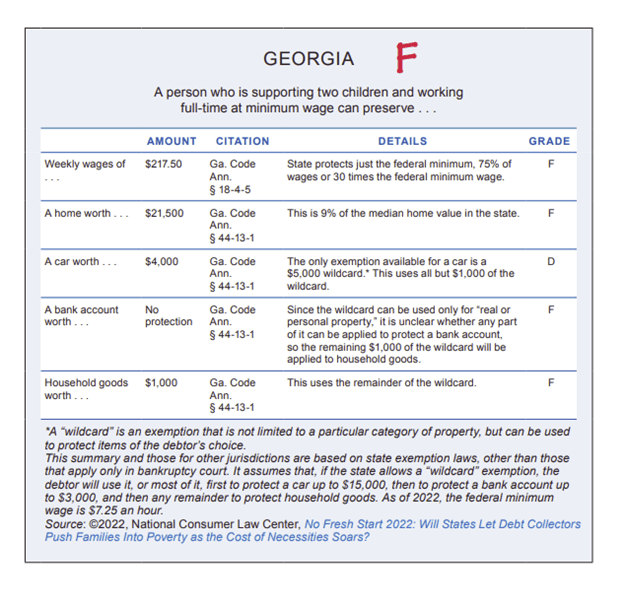Atlanta, GA, January 30, 2023 – With millions of families struggling to find financial stability as soaring inflation drives up the costs of basic necessities, our state legislature plays a vital role in protecting Georgia households from seizure of essential wages and property to pay old debts. But according to a new report from the National Consumer Law Center (NCLC), Georgia has some of the worst protections in the nation.
“According to Georgia Attorney General Chris Carr, debt issues were among the top five complaints into the Department of Law in 2021,” said Liz Coyle, executive director of Georgia Watch. “Hundreds of thousands of Georgians rely on multiple forms of debt to ensure their families have access to basic needs. We need to ensure a financial emergency does not send them spiraling.”
Recognizing the vital need to reform the state’s garnishment laws, Georgia Watch produced “Helping Georgians Manage Garnishment Actions,” a policy paper examining garnishment practices in Georgia and recommending state-level policy changes.
The No Fresh Start report grades each state on its exemption laws, which protect income and property from seizure by creditors, debt buyers, and the debt collectors they hire. Georgia law allows creditors and debt collectors to seize nearly everything a resident owns, even the minimal items necessary for the debtor to continue working and providing for their family. The state failed to meet any of the five basic standards analyzed in the report:
- Preventing creditors from seizing so much of the debtor’s wages that the debtor is pushed below a living wage – F
- Allowing the debtor to keep a used car of at least average value – F
- Preserving the family’s home—at least a median-value home – F
- Preserving a basic amount in a bank account so that the debtor’s funds to pay essential costs such as rent, utilities, and commuting expenses and to weather income and expense shocks are not cleaned out – F
- Preventing seizure and sale of the debtor’s necessary household goods – F
“In states with weak exemption laws, working families are at risk of falling deeper into financial peril if their wages and bank accounts can be seized as they struggle to pay for heat, food, and other necessities,” said Michael Best, staff attorney at the National Consumer Law Center. “Weak protections for the income and assets that families need imperil their health and safety, push them deeper into poverty, and can widen the racial wealth gap.”
State exemption laws are a fundamental protection for families. Without these laws, once a creditor obtains a ruling from a court that a consumer owes it a sum of money, the creditor can seize the debtor’s entire paycheck, bank account, car, and household goods, and sell the debtor’s home. Exemption laws place limits on these seizures.
Without continued improvement to exemption laws, seizures by debt collectors drain away the wages and resources that families need—and that the local economy needs them to be spending at Main Street businesses. Reform of exemption laws not only protects families from destitution but can also act as an economic stimulus tool that steers money into state and local communities.
For more information on NCLC’s work related to fair debt collection, visit nclc.org/topic/debt-collection
+++
About Georgia Watch
Founded in 2002, Georgia Watch is a statewide, non-profit consumer advocacy organization working to inform and protect Georgia consumers on matters that significantly impact their quality of life, including the effects of predatory business practices, the high cost of utilities and healthcare, and restricted access to the civil justice system.
About National Consumer Law Center® (NCLC®)
Since 1969, the nonprofit National Consumer Law Center® (NCLC®) has worked for consumer justice and economic security for low-income and other disadvantaged people in the U.S. through its expertise in policy analysis and advocacy, publications, litigation, expert witness services, and training.

